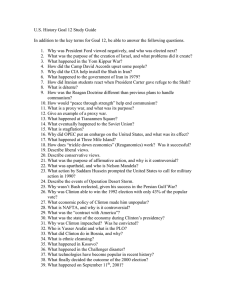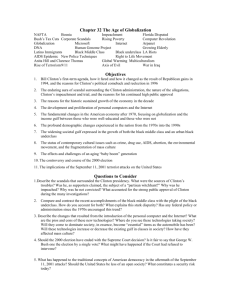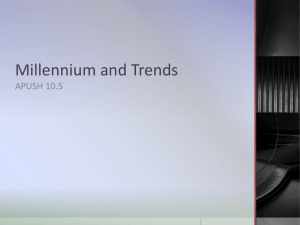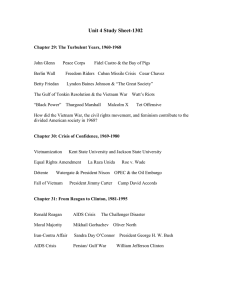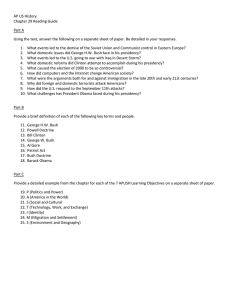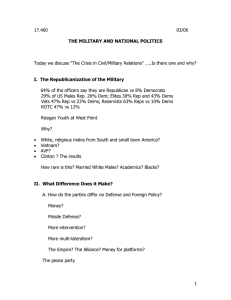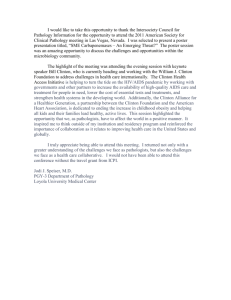America Confronts the Post-Cold War Era, 1992-2004 CHAPTER 41
advertisement
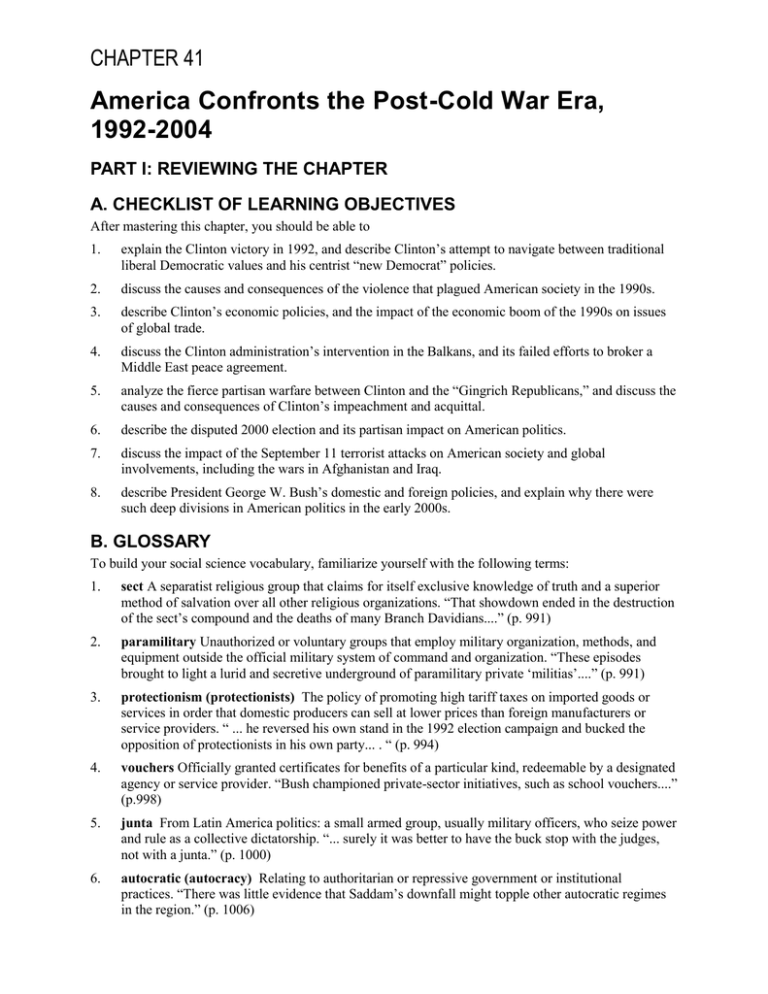
CHAPTER 41 America Confronts the Post-Cold War Era, 1992-2004 PART I: REVIEWING THE CHAPTER A. CHECKLIST OF LEARNING OBJECTIVES After mastering this chapter, you should be able to 1. explain the Clinton victory in 1992, and describe Clinton’s attempt to navigate between traditional liberal Democratic values and his centrist “new Democrat” policies. 2. discuss the causes and consequences of the violence that plagued American society in the 1990s. 3. describe Clinton’s economic policies, and the impact of the economic boom of the 1990s on issues of global trade. 4. discuss the Clinton administration’s intervention in the Balkans, and its failed efforts to broker a Middle East peace agreement. 5. analyze the fierce partisan warfare between Clinton and the “Gingrich Republicans,” and discuss the causes and consequences of Clinton’s impeachment and acquittal. 6. describe the disputed 2000 election and its partisan impact on American politics. 7. discuss the impact of the September 11 terrorist attacks on American society and global involvements, including the wars in Afghanistan and Iraq. 8. describe President George W. Bush’s domestic and foreign policies, and explain why there were such deep divisions in American politics in the early 2000s. B. GLOSSARY To build your social science vocabulary, familiarize yourself with the following terms: 1. sect A separatist religious group that claims for itself exclusive knowledge of truth and a superior method of salvation over all other religious organizations. “That showdown ended in the destruction of the sect’s compound and the deaths of many Branch Davidians....” (p. 991) 2. paramilitary Unauthorized or voluntary groups that employ military organization, methods, and equipment outside the official military system of command and organization. “These episodes brought to light a lurid and secretive underground of paramilitary private ‘militias’....” (p. 991) 3. protectionism (protectionists) The policy of promoting high tariff taxes on imported goods or services in order that domestic producers can sell at lower prices than foreign manufacturers or service providers. “ ... he reversed his own stand in the 1992 election campaign and bucked the opposition of protectionists in his own party... . “ (p. 994) 4. vouchers Officially granted certificates for benefits of a particular kind, redeemable by a designated agency or service provider. “Bush championed private-sector initiatives, such as school vouchers....” (p.998) 5. junta From Latin America politics: a small armed group, usually military officers, who seize power and rule as a collective dictatorship. “... surely it was better to have the buck stop with the judges, not with a junta.” (p. 1000) 6. autocratic (autocracy) Relating to authoritarian or repressive government or institutional practices. “There was little evidence that Saddam’s downfall might topple other autocratic regimes in the region.” (p. 1006) PART II: CHECKING YOUR PROGRESS A. True-False Where the statement is true, circle T; where it is false, circle F. 1. T F Bill Clinton’s presentation of himself as a “new” Democrat was designed to emphasize his commitment to reversing past Democratic party positions on civil rights. 2. T F Clinton’s ambitious reform goals suffered a severe setback when his health-care proposal failed to pass Congress. 3. T F After victory in the 1994 congressional elections, the militant conservatism of Speaker Newt Gingrich stumbled when it shut down the federal government for a time. 4. T F Clinton’s liberal reforms put conservative Republicans on the defensive and led to substantial Democratic gains in the 1994 mid-term Congressional elections. 5. T F The Oklahoma City bombing of 1995 and the Columbine High School shootings of 1999 led to new public demands to toughen gun laws. 6. T F The struggling economy of the 1990s led President Clinton to support increased protectionism and restrictions on the export of American jobs overseas. 7. T F The Clinton administration’s major foreign policy success came in laying the groundwork for a peace settlement between Israelis and Palestinians in the Middle East. 8. T F The two charges on which President Clinton was impeached and then acquitted were perjury before a grand jury and obstruction of justice. 9. T F In the 2000 election, George W. Bush defeated Albert Gore in the Electoral College but not in the popular vote. 10. T F The Supreme Court’s majority ruling that settled the 2000 election controversy was based on the idea that Florida’s hand counting of ballots violated the equal protection clause of the Fourteenth Amendment. 11. T F Once in office, President George W. Bush pursued strongly conservative policies on abortion, the environment, and taxes. 12. T F Osama bin Laden, the mastermind of the September 11 terrorist attacks, was an Afghan Taliban leader who had originally fought the Soviet invasion of his country. 13. T F The United Nations in 1993 declined to authorize the use of force against Iraq to compel compliance with its resolutions. 2 14. T F The USA-Patriot Act passed in response to the September 11 authorized the detention and deportation of immigrants suspected of terrorism. 15. T F In the cases of Gratz v. Bollinger and Grutter v. Bollinger, the Supreme Court banned numerical affirmative action university admissions policies but permitted more flexible approaches. B. Multiple Choice Select the best answer and circle the corresponding letter. 1. Bill Clinton defeated incumbent President Bush in 1992 by focusing especially on the issue of a. women’s rights and gay rights. c. the environment. b. the economy. b. health care. 2. In 1992, businessman H. Ross Perot made the strongest showing of any third-party presidential candidate since Theodore Roosevelt by winning approximately _____ of the popular vote. a. five percent c. twenty percent b. ten percent c. forty percent 3. Two areas where President Clinton’s initial attempts at liberal reform failed badly were a. health care and gay rights. b. the environment and consumer protection. c. gun control and deficit reduction. d. affirmative action and education funding. 4. Two areas where the first Clinton administration achieved the most success in domestic affairs was a. health care and gay rights. b. political campaign reform and term limits. c. gun control and deficit reduction. d. immigration reform and improved race relations. 5. The assault on the Branch Davidian compound in Waco, Texas, and the bombing of the Oklahoma City federal building were extreme, violent expressions of a growing 1990s atmosphere of a. religious belief in the imminent end of the world. b. disillusionment with government and hostility to politicians. c. hostility to free market capitalism. d. anger toward ethnic minorities and immigrants. 6. The new Republican congressional majority led by House Speaker Newt Gingrich caused a severe backlash in favor of President Clinton in 1995 when it a. restricted “unfunded mandates” imposed on state and local governments. b. supported the Welfare Reform Act cutting welfare benefits and requiring recipients to seek employment. c. tried to restrict illegal immigration. d. shut down the federal government for a time and proposed sending children on welfare to orphanages. 7. Despite the great prosperity of the 1990s economy, President Clinton experienced controversy and strong opposition to his policy of a. expanding global free trade and supporting the World Trade Organization. b. reducing the power and benefits of American unions. c. imposing regulations on the highly speculative “dot.com” internet businesses and their stock offerings. d. demanding that China allow full human rights in exchange for greater American trade. 3 8. During the Clinton administration, American troops were deployed on military missions in all of the following countries except a. Somalia. c. Rwanda. b. Haiti. c. Serbia. 9. The Democratic minority’s fundamental defense of the impeachment charges against President Clinton was that a. Clinton had not committed the acts with which he was charged. b. Clinton’s actions were personal failings that did not rise to the constitutional level of “high crimes and misdemeanors.” c. Newt Gingrich and other leading Republicans had also engaged in sexual misconduct. d. the nation could not afford to remove an incumbent president during a time of international crisis. 10. The fundamental issue in the presidential election of 2000 was a. foreign policy toward China, Russia, and Latin America. b. trade policy toward Europe and nations of the Third World. c. whether to use projected budget surpluses for tax cuts or for debt reduction and Medicare. d. whether to build a unilateral American missile defense system. 11. Victory in the 2000 presidential election was eventually awarded to George W. Bush a. when the Florida legislature awarded that state’s electoral votes to Bush. b. when the Supreme Court ruled in Bush’s favor that Florida’s hand counting of ballots was illegal. c. when Al Gore conceded that it was impossible for him to win. d. when a joint session of Congress declared Bush the winner. 12. One of George W. Bush’s first vigorously conservative and nationalistic actions in office was to repudiate American participation in a. the International Atomic Energy Agency. b. the United Nations World Health Organization. c. the International Criminal Court and the Geneva Conventions on the treatment of prisoners. d. the Kyoto Global Warming Treaty. 13. The fundamentalist Islamic party that ruled Afghanistan and shielded Osama bin Laden prior to the September 11 attacks was a. the Party of God. c. Hamas. b. the Taliban. c. the Baath Party. 14. Which of the following was not among the reasons offered by President George W. Bush for America’s 1993 invasion of Iraq? a. Possible Iraqi involvement in the September 11 attacks b. The need for the US to control Iraqi oil supplies c. Saddam Hussein’s possession of weapons of mass destruction d. The idea that the creation of a peaceful, democratic Iraq would inspire hope and reform throughout the Middle East 15. Which of the following was not among the controversial Bush administration policies that led to increased polarization between supporters and opponents of the administration? a. Attorney General Ashcroft’s zealous enforcement of the USA-Patriot Act b. Bush’s strong anti-abortion policies c. The reduction of benefits for Gulf War veterans d. Approaches to gay and lesbian rights 4 C. Identification Supply the correct identification for each numbered description. 1. _________________ ”Centrist” Democratic organization that promoted Bill Clinton’s candidacy as a “new” Democrat 2. _________________ Shorthand phrase for compromise policy that emerged after Clinton’s failed attempt to end ban on gays and lesbians in the military 3. _________________ Fundamentalist group whose compound in Waco, Texas, was assaulted by federal agents in 1993 4. _________________ Colorado high school where a deadly shooting in 1999 stirred a national movement against guns and gun violence 5. _________________ Conservative campaign platform that led to a sweeping Republican victory in the 1994 mid-term elections 6. _________________ H. Ross Perot’s third party that in 1996 received less than half the votes Perot had garnered in 1992 7. _________________ International trade organization that prompted strong protests from anti-global trade forces in Seattle, Washington in 1999 8. _________________ Caribbean nation where Clinton sent twenty thousand American troops to restore ousted President Jean-Bertrand Aristide to power 9. _________________ Clinton Arkansas investment deal that spurred a federal special prosecutor and led to widespread investigations of his administration 10._________________ Third party led by environmentalist Ralph Nader that took votes from Democratic presidential nominee Albert Gore in 2000 election 11._________________ Constitutional institution for choosing presidents that came under severe criticism after the 2000 popular vote winner failed to win the office 12._________________ The other site of direct attack by terrorists on September 11, 2001, besides the twin towers of the World Trade Center 13._________________ The international terrorist network headed by Osama bin Laden 14._________________ Controversial law restricting civil liberties passed in the immediate aftermath of the September 11 attacks 15._________________ Iraqi prison where alleged American abuse of Iraqi prisoners inflamed antiAmerican sentiment in Iraq and beyond D. Putting Things in Order Put the following events in correct order by numbering them from 1 to 5 1. _____ George W. Bush loses the popular vote but wins the presidency with a majority of the Electoral College 2. _____ Republicans win a majority in the House of Representatives after Newt Gingrich promotes the strongly conservative “Contract with America.” 3. _____ Arkansas Governor Bill Clinton defeats incumbent President George H. W. Bush. 4. _____ With authorization from the US Congress but not the United Nations, President George Bush launches a preemptive American invasion of Iraq. 5. _____ Terrorists conduct the first major attack on American soil in two hundred years. 5 E. Matching People, Places, and Events Match the person, place, or event in the left column with the proper description in the right column by inserting the correct letter on the blank line. 1. _____ William J. Clinton 2. _____ H. Ross Perot 3. _____ Hillary Rodham Clinton 4. _____ Robert Dole 5. _____ Newt Gingrich 6. _____ John McCain 7. _____ Slobodan Milosevic 8. _____ Monica Lewinsky 9. _____ William Rehnquist 10. _____ Al Gore a. Young White House intern whose sexual affair with President Clinton led to his impeachment b. President Clinton’s loyal vice president who won the most popular votes but lost the election of 2000 c. George W. Bush’s vice president who vigorously promoted conservative domestic policies and the invasion of Iraq d. Texas billionaire who won nearly twenty percent of the popular vote as third-party candidate in 1992 e. George W. Bush’s controversial attorney general who sharply restricted civil liberties and detained or deported immigrants suspected of terrorism f. Serbian president who conducted vicious “ethnic cleansing” campaigns and was eventually forced from office g. Son of a former president whose narrow election as president in 2000 did not prevent him from pursuing a strong conservative agenda in office h. The first “baby boomer” president who was the first Democrat elected to two full terms since Franklin Roosevelt i. Long time Iraqi dictator who was overthrown by invading American armies in 2003 j. First presidential spouse to be given major policy responsibilities and to win election to the US Senate k. Fiery Republican Speaker of the House who led his party to great victory in 1994 but resigned after Republican losses in 1998 l. Wealthy Saudi Arabian exile who formed a global terrorist network that assaulted the US m. Moderate Republican senator who led the crusade for campaign finance reform but lost 2000 presidential nomination to George W. Bush n. 1996 Republican presidential nominee who was soundly defeated by Bill Clinton o. Chief Justice of the US who presided at the impeachment trial of President Clinton 11. _____ George W. Bush 12. _____ Richard Cheney 13. _____ Osama bin Laden 14. _____ Saddam Hussein 15. _____ John Ashcroft 6 PART III: APPLYING WHAT YOU HAVE LEARNED 1. Was Bill Clinton’s election in 1992 a positive mandate for change, or was it primarily a repudiation of the first Bush administration’s record on the economy? 2. How did the antigovernment mood of the 1990s affect both Bill Clinton and his Republican opponents? In what ways did Clinton attempt to uphold traditional Democratic themes, and in what ways did he serve to consolidate the conservative Bush-Reagan era? 3. What new foreign policy challenges did the US face after the end of the Cold War? What were the principal themes of US relations with the world in the Clinton administration? 4. Why was their so much anti-government rhetoric, political action, and even violence in the 1990s? To what extent did the Clinton administration attempt to counter this mood, and to what extent did it bend to it? 5. Argue for or against: the presidential election of 2000, despite its controversies, demonstrated the strength and resiliency of America’s democracy. 6. What was the impact of the September 11, 2001, terrorist attacks on America’s national priorities and foreign policies. Is it true that “everything changed” after September 11, or were there significant areas in which America’s global aims remained essentially the same? 7. What caused the increased polarization in American politics in the early 2000s? Is it appropriate to align this polarization with the two political parties and their respective strengths in “red states” and “blue states”. Are there significant issues that have not been affected by this political polarization? 7

